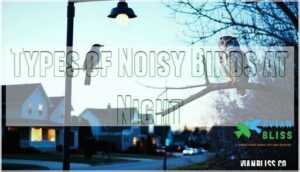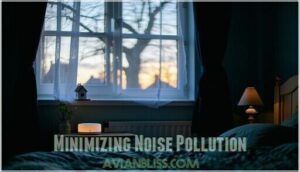This site is supported by our readers. We may earn a commission, at no cost to you, if you purchase through links.

Turn off unnecessary outdoor lights, close curtains to block indoor lighting, and remove bird feeders before dusk.
For persistent chirpers, try white noise machines or install motion-activated lights that startle them away.
If you’re dealing with a pet bird, cover their cage with a dark cloth to signal bedtime.
City lights often trick birds into thinking it’s dawn, so blackout curtains work wonders.
The key is consistency – birds adapt quickly to routine changes.
Several specialized techniques can amplify these basic strategies for stubborn cases.
Table Of Contents
- Key Takeaways
- Reasons for Nocturnal Chirping
- Types of Noisy Birds at Night
- Minimizing Noise Pollution
- Reducing Light Pollution
- Helping Your Bird Sleep Better
- Creating a Bird-Friendly Environment
- Bird Deterrent Methods
- Embracing Your Bird’s Chattiness
- Managing Bird Activity at Night
- Seeking Professional Help
- Frequently Asked Questions (FAQs)
- How to stop birds from chirping?
- Do birds chirp at night?
- How to stop pigeons chirping?
- How do you get rid of chirping birds at night?
- How do I stop birds from chirping in my Window?
- Why do cockatiels chirp at night?
- What does it mean when birds are chirping like crazy at night?
- How can I stop birds from chirping at night?
- How to scare birds away at night?
- How to shut up chirping birds?
- Conclusion
Key Takeaways
- You’ll get the best results by eliminating outdoor lights and closing curtains, since artificial lighting tricks birds into thinking it’s daytime and disrupts their natural sleep cycles.
- White noise machines or fans can effectively mask persistent bird sounds, while motion-activated lights will startle away stubborn chirpers from your property.
- If you’re dealing with a pet bird, cover their cage with dark cloth at bedtime and establish consistent sleep routines to reduce nighttime vocalizations.
- Remove bird feeders before dusk and secure trash cans, as eliminating food sources makes your property less attractive to nocturnal visitors.
Reasons for Nocturnal Chirping
You’ll find that birds chirp at night for several key reasons, including natural nocturnal behavior, territorial marking, mate calling, and responses to artificial lighting that disrupts their sleep cycles.
Understanding these triggers helps you identify whether you’re dealing with naturally active night birds like owls and whip-poor-wills, or daytime species confused by urban light pollution and household disturbances, which can be influenced by artificial lighting.
City Noise and Light Pollution Effects
Living in bustling cities exposes birds to constant noise amplification and artificial lighting that disrupts their natural rhythms.
City lights and traffic sounds trick birds into singing when they should be sleeping.
Urban birdsong now competes with traffic sounds, forcing birds to sing louder and later into the night.
Light disruptions from streetlights and buildings trick birds into thinking it’s daytime, causing habitat alteration in their sleep patterns.
These environmental changes create persistent night bird sounds and affect migration impacts, making birds chirping at night a growing urban challenge.
This is further exacerbated by increased mating behaviors during breeding season.
Household Noise and Lighting Disruptions
Your own home might be the culprit behind those night bird sounds. Bright indoor lights create light pollution impact that tricks birds into thinking it’s dawn.
Loud TVs and household noise disrupt their sleep schedule changes, causing sleep disturbance birds.
Here’s how to stop nocturnal birds:
- Install indoor soundproofing materials like heavy curtains
- Use room rearrangement to block light spillage
- Practice noise source identification around your property
- Switch to bird-friendly lighting after dark
Stress and Loneliness in Birds
Behind many sleepless nights lies a deeper issue: stress and loneliness trigger excessive nocturnal chirping in pet birds.
Cage confinement without adequate social interaction creates anxiety, leading to vocalization changes and boredom signs like feather plucking.
| Stress Indicator | Behavioral Sign | Solution |
|---|---|---|
| Loneliness | Excessive calling | Increase social interaction |
| Boredom | Feather plucking | Provide enrichment toys |
| Anxiety | Vocalization changes | Establish consistent routine |
Understanding bird stress prevents those 3 AM wake-up calls.
Natural Bird Behavior and Instincts
Beyond stress factors, instinctual birdsong drives nocturnal activity patterns.
Bird behavior follows ancient programming that doesn’t respect your sleep schedule. Understanding these natural communication systems helps explain why birds ignore your need for quiet.
Three primary instincts trigger bird sounds at night:
- Migration Patterns: Nocturnal birds use calls for navigation during seasonal journeys, with bird circadian rhythms adapted for nighttime travel.
- Mating Rituals and Territorial Defense: Males sing to attract partners and warn competitors away from claimed areas.
- Natural Communication: Bird activity patterns include contact calls between flock members during darkness hours.
Types of Noisy Birds at Night
Several nocturnal bird species create the soundtrack that keeps you awake at night. Northern Mockingbirds top the list, mimicking other birds and even mechanical sounds until 2 AM during mating season. These vocal performers don’t know when to quit.
American Robins surprise many homeowners by singing well past sunset, especially under streetlights. Their cheerful melodies sound less charming at midnight. Barred Owls contribute haunting "who-cooks-for-you" calls that echo through neighborhoods.
Cardinals occasionally extend their bright chirping into dusk hours. Eastern Whip-poor-wills repeat their name endlessly, creating a rhythmic but persistent chorus. Some birds, like the Eurasian Nightjar, are global night singers.
Urban bird sounds differ from rural areas, with city birds adapting their schedules around artificial lighting. Pet bird noises from neighbors’ homes add another layer of nighttime disturbance. Migratory bird calls increase during spring and fall when birds travel through your area.
Identifying birdsong helps you understand which species are disrupting your sleep.
Minimizing Noise Pollution
Reducing noise pollution in your home environment can substantially decrease birds’ tendency to chirp throughout the night.
You’ll find that controlling household sounds, timing noisy activities appropriately, and using white noise machines creates a calmer atmosphere that encourages natural bird sleep patterns.
Household Noise Reduction Techniques
Soundproofing windows with double-pane glass cuts outdoor noise by 50%.
Insulating walls adds mass for better sound blocking. Install acoustic panels on walls and noise-dampening curtains over windows.
Thick carpeting absorbs sound waves effectively.
These noise reduction methods create quieter indoor environments, reducing sleep disturbance from external bird activity and improving overall sleep solutions.
Environmental noise can substantially impact overall sleep quality.
Scheduling Loud Activities
Timing your household activities strategically reduces Daytime Noise Impact on birds and prevents sleep disturbance at night.
Understanding your local Bird Sleep Cycle helps with Activity Time Adjustment. Many communities have Noise Ordinance Awareness rules supporting Community Noise Reduction.
Here’s your action plan:
- Schedule vacuuming and lawn mowing before 6 PM
- Run dishwashers and washing machines during afternoon hours
- Avoid power tools after sunset when nocturnal birds become active
- Time construction projects for mid-morning when bird sounds are naturally louder
Noise reduction starts with smart scheduling.
White Noise Machines for Birds
White noise machines offer impressive machine effectiveness for masking disruptive bird sounds at night.
These devices improve human sleep by creating consistent background noise that drowns out chirping. Different bird species show varying noise tolerance levels, so experiment with sound frequencies between 2-5 kHz.
A simple fan works as budget-friendly bird deterrents, while specialized machines provide superior sound masking. Some birds produce whistle-like territorial calls that white noise can effectively mask.
Even stubborn nocturnal singers can’t compete with steady white noise.
Reducing Light Pollution
You can substantially reduce nighttime bird chirping by controlling artificial light sources that disrupt their natural sleep cycles.
Artificial lighting tricks birds into thinking it’s daytime, causing them to remain active and vocal when they should be resting, due to the disruption of their natural sleep cycles by artificial lighting.
Heavy Curtains and Blackout Blinds
Heavy curtains and blackout blinds tackle light blocking while providing impressive noise reduction benefits.
Choose thick, dense fabrics that create a barrier against both artificial lighting and nocturnal birds.
Proper installation prevents light seepage around edges, supporting natural sleep improvement.
These window treatments offer energy savings too, making them practical nighttime bird deterrents for bird noise control and resolving bird-related sleep issues.
Double-Glazed Windows for Soundproofing
Double-glazed windows create an effective barrier against bird noise pollution while boosting your home’s energy efficiency.
These specialized windows use two glass panes with an air gap that absorbs sound waves, achieving noise reduction of 50-90%. Window installation costs vary, but the investment pays off through improved home value and quieter nights.
Many homeowners look to purchase window products for their soundproofing needs.
Consider these sound dampening benefits:
- Block bird noise with STC ratings of 45 or higher
- Bird soundproofing that reduces external sounds by 75-95%
- Cost analysis shows long-term savings through energy efficiency
Helping Your Bird Sleep Better
When you’re dealing with a pet bird that won’t stop chirping at night, the solution often starts with improving their sleep environment and establishing consistent routines.
You’ll find that addressing light sources, creating proper cage coverage, and training your bird to recognize bedtime can substantially reduce nighttime vocalizations.
Finding The Source of Noise or Light
Since bird sounds in urban areas often stem from multiple sources, you’ll need to identify species and pinpoint exact noise direction and light origin.
Check for time correlation between environmental factors and bird activity – does chirping intensify near streetlights or electronic devices.
Use a flashlight to trace light sources while listening for specific bird-related sleep issues patterns.
Covering The Cage for Better Sleep
Anyone can transform their chatty pet birds into peaceful sleepers with proper cage covering techniques.
This simple method mimics natural darkness, encouraging bird quietness through the night.
- Fabric Choice: Select breathable materials like cotton to prevent overheating while blocking light effectively
- Cage Size: Make certain covers fit snugly without restricting airflow around bird cages
- Airflow Concerns: Leave small gaps for ventilation during bird training sessions
- Gradual Introduction: Introduce covers slowly to monitor behavioral changes in your feathered friends
Establishing a Bedtime Routine
Build up consistent timing by setting the same bedtime each night, creating predictable bird activity cycles.
Start with gradual adjustment if your bird isn’t used to routines.
Enhance cage comfort with soft perches and cozy corners.
Establish pre-sleep rituals like dimming lights and playing gentle music.
Maintain a quiet environment to support natural bird behavior patterns and reduce birds chirping at night.
Training Your Bird to Be Quiet
Positive reinforcement works wonders for vocalization control.
Reward your bird immediately when they’re quiet with treats or gentle praise.
Ignoring chirping prevents accidentally reinforcing noisy behavior – don’t respond to attention-seeking calls.
Instead, focus on redirecting attention to toys or activities during training sessions.
Quiet training methods require patience and consistency.
Practice bird behavior observation to identify triggers causing excessive noise.
Establish short, focused sessions where you reward calm behavior.
Through bird behavior modification, you’ll create peaceful nighttime routines for better sleep.
Creating a Bird-Friendly Environment
You can reduce nighttime bird activity by removing the food sources and shelter that attract them to your property in the first place.
This approach focuses on making your home less appealing to birds rather than forcing them away through deterrents.
Bird-Proofing Your Home
Several strategic modifications can transform your home into a bird-deterrent fortress while maintaining its appeal.
Effective bird proofing requires targeting key access points where birds typically enter or roost.
- Seal Entry Points: Install mesh screens over vents, gaps, and openings where birds might nest or enter your home’s interior spaces.
- Window Deterrents: Apply bird-safe decals or install physical barriers like bird netting to prevent collisions and discourage perching on windowsills.
- Balcony Barriers: Use transparent bird control netting or wire systems to block access while preserving your outdoor space’s functionality.
- Chimney Protection: Install chimney caps with mesh screening to prevent birds from nesting inside while maintaining proper ventilation airflow.
Removing Food Sources and Bird Feeders
Removing food sources acts like turning off a dinner bell for nocturnal visitors.
Remove feeders after sunset and secure trash bins with tight lids.
Clean spills from pet bowls and birdbaths promptly.
Limit food availability by storing seeds indoors.
These bird control measures reduce nighttime activity, making your backyard bird control efforts more effective for peaceful evenings.
Bird Deterrent Methods
When you need to discourage birds from gathering near your home at night, proven deterrent methods can effectively reduce their vocal activity.
These techniques work by making your property less attractive to birds through sound barriers, physical obstacles, and visual disruptions that don’t harm the animals.
Bird Deterrent Methods Introduction is implied in the context of using these proven deterrent methods.
Sonic Deterrents and High-Frequency Sounds
Sonic deterrents offer targeted bird control through high-frequency sound generators and ultrasonic bird repellers operating between 20-60 kHz.
Sonic cannons deliver 130-decibel blasts covering 10-acre areas while remaining above human impact thresholds.
Sonic generators create randomized predator calls for species targeting effectiveness.
Sonic effectiveness varies by bird type, with frequency ranges requiring adjustment for maximum results.
Check legal restrictions before deploying bird sound deterrents in residential areas.
Physical Barriers and Bird Netting
Physical barriers create an invisible fortress against birds chirping at night.
Bird netting installation requires careful surface preparation to guarantee material durability and minimize aesthetic impact.
Professional bird control methods prove most effective for lasting results. For help with this, consider bird netting products.
Consider these essential bird proofing techniques:
- Wire mesh barriers for small gaps and entry points
- Bird spikes on ledges and perching surfaces
- Slope installations to prevent roosting areas
- Shock tape for gentle electric deterrence
- Regular maintenance to preserve barrier effectiveness
Light-Based Deterrents and Laser Lights
Beyond physical barriers, laser lights create moving pinpricks that confuse and deter birds at night.
These automated systems cover up to 10,000 square feet, using green light spectrum for maximum bird deterrence effectiveness.
To effectively deter birds, consider exploring a laser bird deterrent.
| Laser Type | Coverage Area | Safety Level | Effectiveness |
|---|---|---|---|
| Green Automated | 10,000 sq ft | Professional-grade | High |
| Manual Handheld | 500 sq ft | Consumer-safe | Moderate |
| Motion-activated | 2,000 sq ft | Bird-friendly | Variable |
| Fixed-beam | 1,000 sq ft | Low-intensity | Limited |
Professional systems prevent light habituation through randomized patterns, addressing safety concerns while maintaining consistent bird control results.
Embracing Your Bird’s Chattiness
Sometimes you can’t eliminate nighttime bird sounds, and accepting this natural behavior becomes your best option.
You can actually use consistent bird chirping as a form of white noise that masks other disruptive sounds and helps you sleep better, which is a key aspect of using natural behavior to your advantage.
Accepting Natural Bird Behavior
Understanding your feathered neighbors’ nocturnal habits transforms frustration into appreciation.
Birds chirping at night reflects natural survival instincts, not deliberate disruption of your sleep.
Consider these birdwatching benefits of accepting bird behavior:
- Species appreciation grows when you recognize different calls and their purposes
- Coexistence strategies develop as you learn birds’ perspective on sharing urban spaces
- Natural habitats understanding deepens through observing authentic bird habits in cities
Using Bird Sounds as White Noise
When you can’t beat them, join them—bird sounds can actually become your natural sleep aid.
Soothing birdsongs and carefully curated bird soundscapes create calming ambiance that masks more jarring noises.
Apps and sound libraries offer gentle recordings that transform disruptive birds chirping at night into beneficial white noise.
This approach works by masking annoyances while providing consistent background sound your brain can tune out.
Rather than fighting bird noise reduction, you’re embracing it as a solution for bird-related sleep issues through strategic sound management.
Managing Bird Activity at Night
You can reduce nighttime bird activity by modifying your outdoor environment to make it less attractive to nocturnal species.
Installing bird-friendly lighting and removing food sources creates conditions that discourage birds from gathering near your home during evening hours.
Installing Bird-Friendly Lighting
Switching from accepting bird chatter to actively reducing nighttime disturbances requires strategic lighting adjustments.
Bird-friendly lighting substantially decreases nocturnal chirping by reducing visual confusion that triggers vocalizations.
Proper illumination creates bird friendly environments while addressing birdrelated sleep issues.
- Light spectrum: Choose warm-colored LED fixtures with longer wavelengths
- Shielded fixtures: Direct light downward to minimize sky glow
- Motion sensors: Activate lighting only when needed
- Dimming schedules: Reduce intensity 50-70% during peak migration seasons
Removing Attractants and Food Sources
Food sources act like magnets for chattering birds.
Eliminate feeders completely and secure garbage cans with tight-fitting lids.
Limit water sources by emptying birdbaths and fixing leaky faucets.
Practice fruit tree management by harvesting ripe fruit promptly.
Store pet food indoors overnight.
These bird habitat modifications reduce nighttime visitors substantially, creating the peaceful environment you deserve.
Seeking Professional Help
When DIY methods fail, professional bird control solutions become necessary.
Contact an ornithologist consultation or avian veterinarian for species-specific guidance. Pest control specialists offer thorough bird management strategies, while bird behaviorists analyze root causes.
For persistent issues, animal control services provide bird removal options.
Recognizing early signs of illness such as changes in breathing can be vital.
Some areas allow legal recourse for chronic bird noise complaints, ensuring peaceful nights ahead.
Frequently Asked Questions (FAQs)
How to stop birds from chirping?
You can stop birds from chirping by installing physical barriers like bird spikes or netting.
Using sound deterrents such as predator calls, or applying liquid repellents can also be effective methods.
Masking the noise with white noise machines is another option to consider.
Do birds chirp at night?
Birds barely chirp at night naturally.
You’ll hear nocturnal species like owls, whip-poor-wills, and mockingbirds during breeding seasons.
Urban lighting and territorial disputes can trigger occasional nighttime vocalizations from typically daytime songbirds.
How to stop pigeons chirping?
You can deter pigeons from chirping by installing bird spikes on perching surfaces.
Using sonic deterrents with predator calls, applying liquid repellents, or placing reflective tape that irritates their eyes and disrupts roosting patterns can also be effective methods.
How do you get rid of chirping birds at night?
Install sonic deterrents that emit predator calls,
use white noise machines to mask sounds,
apply bird repellent on roosting areas.
Or relocate temporarily to quieter rooms
until seasonal chirping naturally decreases.
How do I stop birds from chirping in my Window?
That endless dawn chorus outside your window feels like nature’s alarm clock gone rogue.
You’ll need bird spikes on windowsills, reflective tape, or wire barriers.
These create uncomfortable perching surfaces that’ll send feathered visitors elsewhere.
Why do cockatiels chirp at night?
Your cockatiel chirps at night due to stress, seeking attention, or natural instincts.
They’re responding to darkness, unfamiliar sounds, or feeling insecure.
Cover their cage partially to create a cozy sleeping environment.
What does it mean when birds are chirping like crazy at night?
Like telegraphs once carried urgent messages through the night, frantic bird chirping signals danger, territorial disputes, or mating calls.
You’re hearing their survival instincts – they’re communicating threats, marking territory, or seeking mates during peak activity periods.
How can I stop birds from chirping at night?
You can use white noise machines, earplugs, or fans to mask chirping sounds. Physical deterrents like bird spikes, netting, or motion-activated lights discourage roosting near your home effectively.
How to scare birds away at night?
Feathered insomniacs driving you batty?
You’ll need motion-activated lights, owl decoys, or ultrasonic repellers to send night chirpers packing.
Install these deterrents near roosting spots for maximum effectiveness against nocturnal bird activity.
How to shut up chirping birds?
You can quiet chirping birds using white noise machines, earplugs, or fans to mask sounds.
Install bird spikes, netting, or reflective tape around roosting areas.
Motion-activated sprinklers effectively discourage nighttime visits.
Conclusion
Research shows that urban birds sing up to 14% louder at night due to artificial lighting disruption.
You’ve now learned how to stop birds chirping at night through proven methods like eliminating light sources, reducing noise pollution, and creating proper sleep environments.
Whether you’re dealing with outdoor birds or pet companions, consistency remains key.
These techniques work best when combined rather than used individually.
Start with the simplest solutions first, then progress to more specialized deterrents if needed for lasting quiet.
- https://www.sciencedirect.com/science/article/pii/S0048969721070625
- https://pmc.ncbi.nlm.nih.gov/articles/PMC3574330/
- https://academic.oup.com/auk/advance-article/doi/10.1093/ornithology/ukaf002/7951360
- https://harriscenter.org/conservation-research-2022/research-on-our-lands/nocturnal-flight-call-monitoring
- https://is-ebird-wordpress-prod-s3.s3.amazonaws.com/wp-content/uploads/sites/97/2024/05/Nocturnal-Survey-Guide_final.pdf















